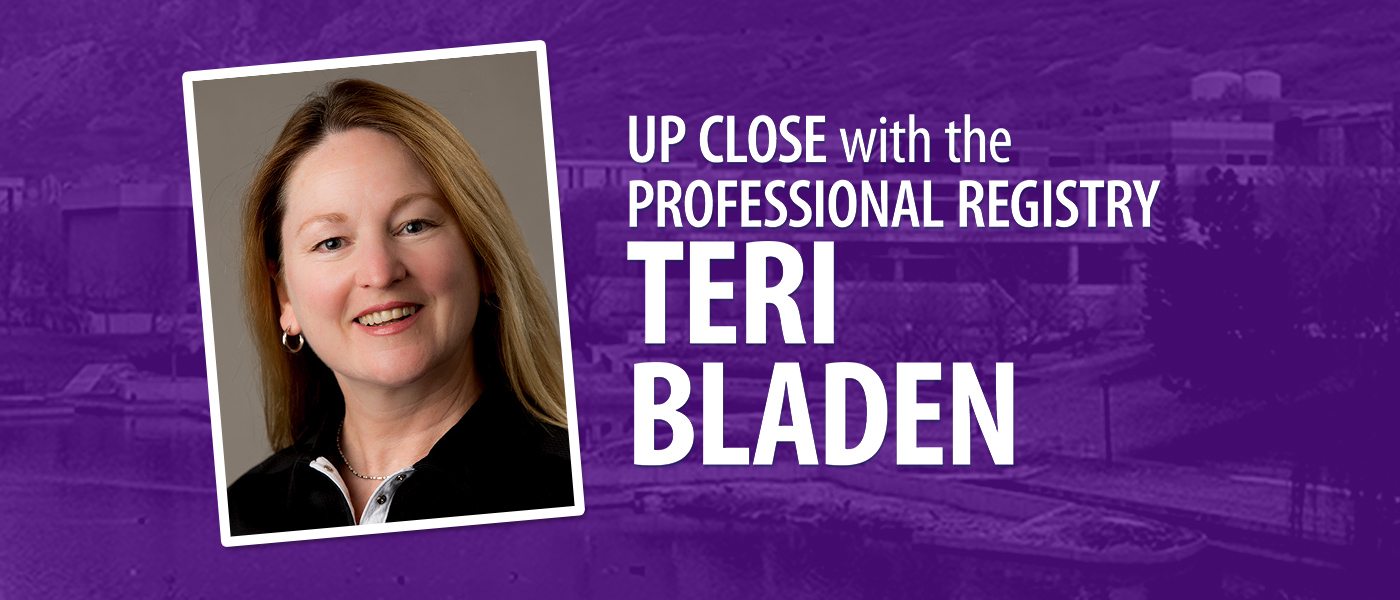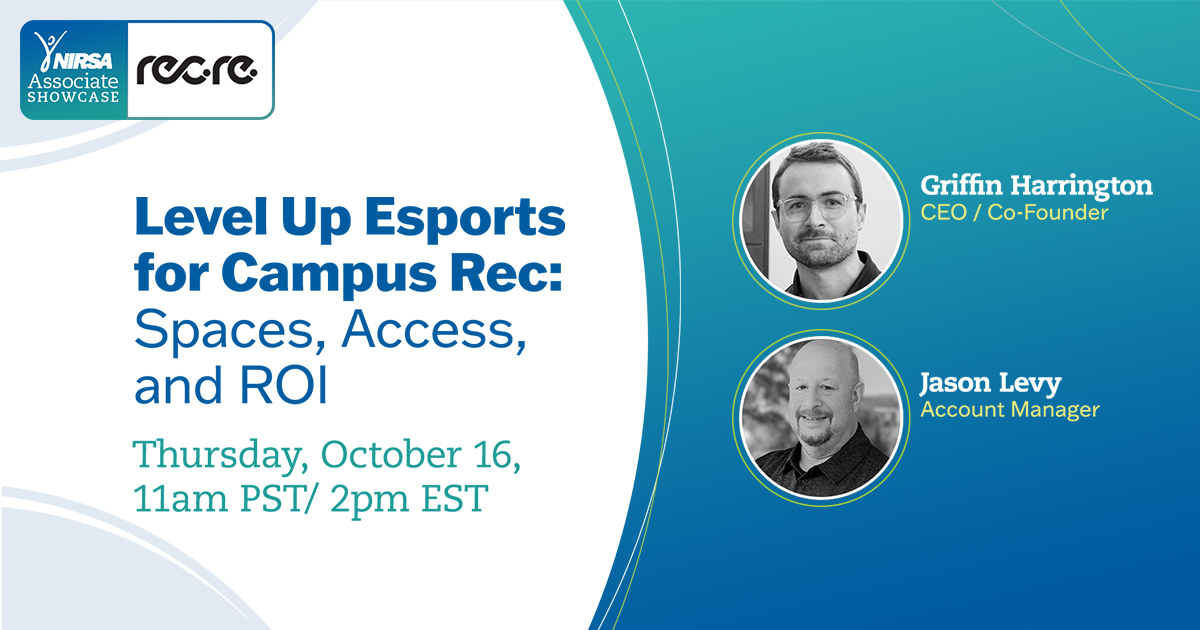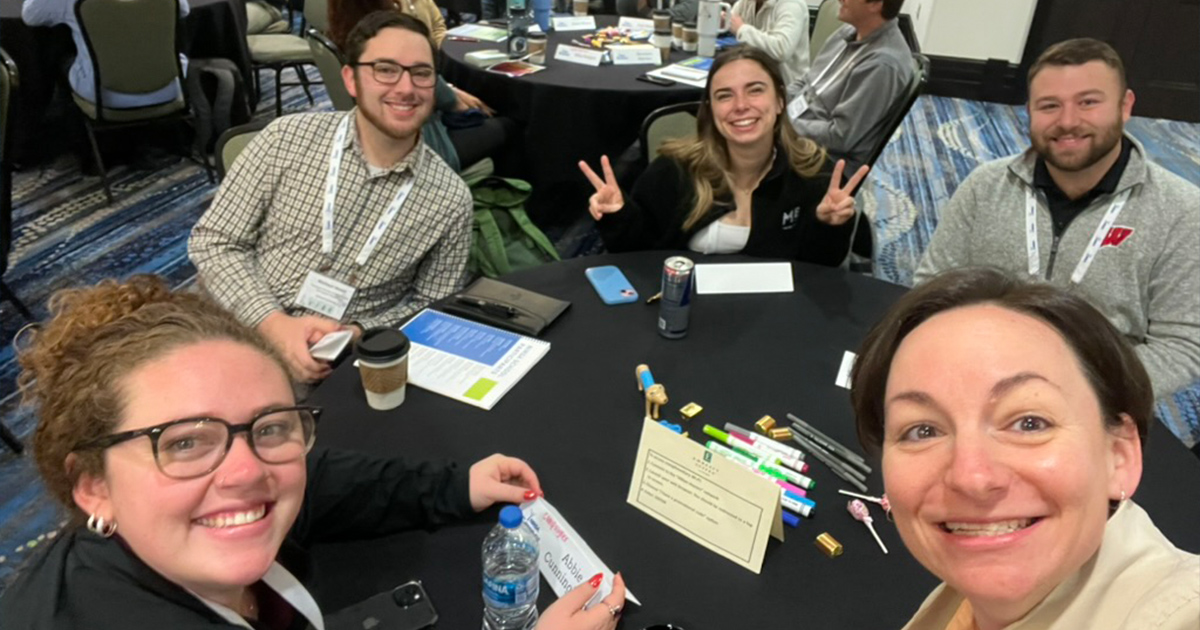Like many professionals in collegiate recreation, Teri Bladen‘s career can be traced back to a formative undergraduate experience. A non-traditional, first-generation college student, Teri got to campus at Indiana University and started going to the group exercise classes available to her as a student since she had enjoyed aerobic classes with her mother back in her hometown. She had so much fun that she decided to audition to teach group exercise, and, according to her, was hired for her personality, though she quickly began learning more about fitness as she became more and more immersed in recreation.
Her supervisor noticed how much she enjoyed the strength side of fitness and invited her to teach a women and weights class that inspired Teri to get her personal training certificate. “I started realizing that fitness could be a career path,” she says.
Though she was majoring in French, her positive attitude and willingness to volunteer got her noticed by the right people, and when Indiana University was opening up a new student recreational center in the mid-90s, Jackie Puterbaugh reached out to see if Teri would be interested in becoming a graduate assistant.
“I got an amazing experience on the facilities side as well as experience in management and administration as a graduate assistant,” says Teri. These experiences, along with volunteering in other areas of recreation such as with sports clubs and aquatics, set Teri up for success as a professional after getting her master’s degree in kinesiology.
Her first professional job was at the University of Illinois Urbana–Champaign, where she had the pleasure of working with Robyn Deterding and the late Tony Clements. “How could you not fall in love with campus recreation under that guidance and support?” says Teri. “I’ve been very privileged in my path.”
Working for cohesion
Teri’s current position is director of Campus Recreation at Weber State University in Ogden, Utah. After working at a number of universities as well as in the private and corporate fitness realms due to moves around the country related to her husband’s job, she was hired in 2008 at Weber State for an intramural/club sports position. The director had recently retired, and Teri sensed an opportunity to create cohesion in the department by lending her leadership skills. She served as the interim director and was hired full time in 2009.
She noticed an opportunity for NIRSA, which had been instilled early on in Teri as “a prominent part of development and commitment” in the field, to be more active and visible within the region. “I stepped up and served as State Director for a few years because we had an absence of NIRSA engagement, and I’ve always wanted to be involved with NIRSA and give back because NIRSA has been there for me as I’ve grown up in the industry,” says Teri.
Through her volunteer work with NIRSA, Teri was able to keep informed of what was going on in the Association and was interested to hear about the development of the Registry of Collegiate Recreational Sports Professionals (RCRSP), a competency-based credentialing system carefully developed around the eight, research-identified, core knowledge areas of Philosophy & Theory; Programming; Management Techniques; Business Procedures; Facility Management, Planning, and Design; Assessment, Evaluation, and Research; Legal Liability and Risk Management; and Personal & Professional Qualities.
The NIRSA Professional Registry encourages a commitment to intentional professional development as its members seek out involvement opportunities to advance their knowledge and skills in the industry and contribute to the Association through volunteer service, all of which Teri was already passionate about doing. To her, the Registry was a logical next step in her professional career and an “opportunity to continue to validate the profession.”
Closing the gap
Teri appreciates the obvious thought that went into the creation of the Professional Registry—it took nearly a decade to develop and ensure it was aligned with similar types of credentialing programs. “The Registry is a structured way of documenting that our profession is a true profession and an impactful profession,” she says. “I appreciate the rigor and clarification that went into it. The core competencies that NIRSA developed are the foundation, and it acknowledges the level of professionalism and expertise that our industry has to offer.”
Teri says that as a director there are many skills learned on the job: skills related to programming, human resources, and facility management. But she adds that the core competencies can “close the gap” in the areas she doesn’t regularly work in. “I came up through the exercise science realm so the whole philosophy and theory of higher education and learning in campus recreation is an area for me to grow in,” she explains. “The core competencies helped me recognize that I need to be a little more intentional about ensuring that I’m exploring and continuing to develop that philosophical and theoretic side of what we do.”
Teri sees the core competencies as a road map to help navigate her professional development and focus. “I want to make sure that I’m not just doing the day to day, but that I am really being thoughtful and intentional about the growth so I can continue to develop my skillset and impart that on my team and hopefully the students,” she says.
Starting the conversation
Teri sees another valuable aspect of the Professional Registry being the way it can spark conversations about the profession. “I love when folks ask me what all the letters after my name mean. It opens the door for us to have a conversation about my professional designation,” she says. “I’m able to explain the rigorous requirements and NIRSA as a professional organization for recreation professionals, which really validates what we do. It’s an ongoing challenge of helping people understand that we just don’t kick balls around all day. It’s not all just about play time. The Registry demonstrates that we are experts in our field and heightens the professionalism of our industry.”
Of course, the Professional Registry is more than just a talking point for those who are unfamiliar with recreation as a profession. Continuing education is crucial for staying up-to-date in the field and maintaining dialogues about challenges such as barriers for female leadership. Teri shares that she recently attended the Women’s Leadership Institute as a continuing education opportunity and was impressed with the caliber of research being done. “I think it can help bolster women in leadership in collegiate recreational sports,” she says.
Teri counts herself fortunate in coming through the ranks with strong women leader role models like past recipient of the NIRSA Honor Award Kathy Bayless at Indiana University, Robyn Deterding at the University of Illinois, Cheryl Kent at the University of Northern Colorado, and Past President of NIRSA Tamra Garstka at Arizona State. “I’ve never been bereft of female leaders, but it does continue to amaze me how we still have barriers,” she says. “Our industry can still be dominated by men even when they don’t intend to perpetuate a ‘good ole boy’ network,” she says. “Women should have strategies to manage those barriers; address the issue, have the conversation, recognize that, yes, these experiences do happen.”
One particular strategy Teri has found useful is: sit at the table. “If you come into the room and there’s an open chair at the table, don’t sit on the side because you don’t want to interfere. Having a presence at the table is huge. Don’t be a bystander; don’t be passive. Be very proactive about engaging and sharing your opinions,” she says. Despite the frustration of feeling the need for extra tact in communication to avoid being perceived in a negative light, Teri remains optimistic about women in leadership. “I look at it like a game. It’s a challenge. I don’t want it to be a barrier. I try to make it fun.”
She recalls an experience she had discussing justifications for use of facility space with an intimidating male department head. While he “invaded her space” and towered over her, Teri stood her ground. “I just had to laugh at it because it was so old school,” she says. “It could have been a very negative experience but I try to keep a positive attitude.”
Whether the challenge is being a woman in the workplace, validating a profession that is still working to articulate its tremendous value, or another obstacle, continuous professional development and education are key for success. “I have no problem promoting and advocating for the Registry because I feel that we still have a bit of a battle on our hands as an industry as far as being seen for the value that we add to the student experience,” says Teri.
Being a part of the Professional Registry is a crucial way to foster skills, maintain a well-rounded professionalism, and intentionally document the high standards of excellence demanded of professionals in the field of collegiate recreation.
- For more information about the Registry of Collegiate Recreation Sports Professionals, please contact NIRSA Director of Professional Development Kristen Gleason.
Sarah Kosch is a Communications Specialist at NIRSA.








